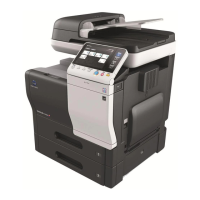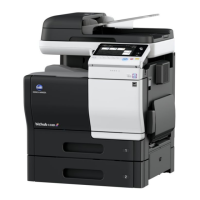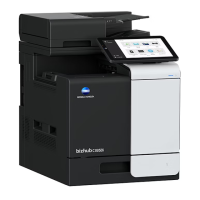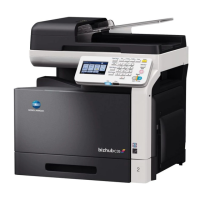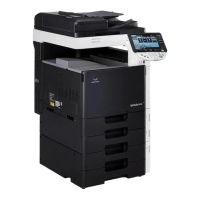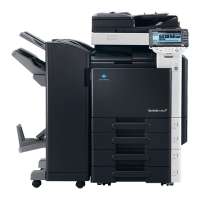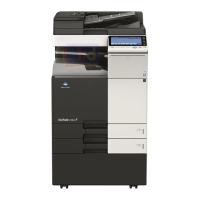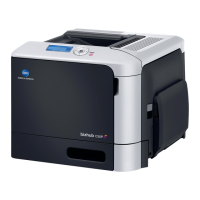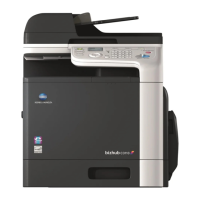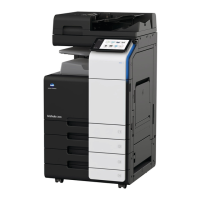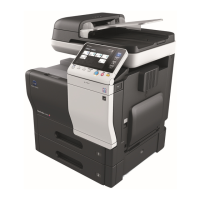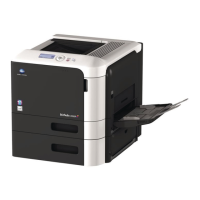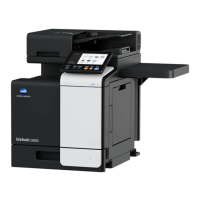
Do you have a question about the Konica Minolta bizhub C3320i and is the answer not in the manual?
| Print Speed | 33 ppm |
|---|---|
| Print Resolution | 1200 x 1200 dpi |
| Scan Resolution | 600 x 600 dpi |
| Duplex Printing | Yes |
| Mobile Printing | AirPrint, Google Cloud Print, Mopria, Konica Minolta Mobile Print |
| Memory | 4 GB |
| Functions | Print, Copy, Scan, Fax |
| Copy Speed | 33 cpm |
| Copy Resolution | 600 x 600 dpi |
| Operating System Compatibility | Windows, Mac OS, Linux |
| Connectivity | Ethernet, USB 2.0, Wi-Fi |
| Display | 7-inch touchscreen |
| Type | Laser |
| Fax Resolution | 600 x 600 dpi |
| Dimensions | 420 x 528 x 495 mm |
This [Quick Guide] uses illustrations to describe operating procedures for the most commonly used functions in an easy-to-understand way.
Discusses environmental benefits of power management, recycled paper, and duplex printing for resource saving.
Contains detailed instructions on operation and maintenance, including warnings and precaution symbols.
Lists regulatory compliance information, including CE Marking and radio frequency power details.
Highlights safety precaution notations and labels on the machine, with warnings for specific actions.
Provides specific notices for users in Canada and the USA regarding telephone connection and FCC requirements.
Details recommended space requirements for machine operation, consumables replenishment, and maintenance.
Outlines precautions for optimal machine performance, including power source, operating environment, and storage of copies.
Lists legal restrictions related to reproducing certain documents, financial instruments, and copyrighted works.
Describes the company's commitment to reducing environmental impact and implementing resource-saving steps.
Defines the intended use of the Multi Function Product and impermissible operating conditions.
Identifies the intended users for the system's guides, categorizing them as User and Administrator.
Explains the structure of the user's guide, including the manual and the HTML User's Guide.
Explains the meaning of various symbols and notations used throughout the manual for warnings, tips, and references.
Provides information on the default administrator password and the recommendation to change it periodically.
Guides users on how to navigate and use the HTML User's Guide for detailed information.
Specifies the supported operating systems, web browsers, and display resolution for optimal use of the HTML User's Guide.
Lists and describes optional components that can be added to the main unit, such as authentication units and tables.
Identifies and describes the various parts of the main unit, focusing on the front and side views.
Explains the machine's power supply components, the main power switch, and the power key for entering power save mode.
Describes the components of the control panel, including the touch panel, start/stop keys, and warning indicator.
Details the layout and functions of the home screen on the touch panel, including user account, job list, and function keys.
Explains how to log in when user authentication is enabled, including entering credentials and performing authentication.
Describes methods for loading originals, either into the ADF or onto the original glass.
Provides instructions on how to load multi-page or single-sheet originals into the Automatic Document Feeder (ADF).
Explains how to place small originals like books or business cards directly onto the original glass.
Details how to load frequently used paper into the paper tray and special paper types.
Instructs on loading up to 500 sheets of plain paper into Tray 1, listing applicable paper types.
Explains how to load paper, including special types and envelopes, into the bypass tray.
Provides precautions and instructions for loading envelopes into Tray 1 and the Bypass Tray.
Offers precautions and instructions for loading postcards into Tray 1 and the Bypass Tray.
Details the basic operations for making copies, including login, loading originals, and starting the copy process.
Guides users through the basic steps of printing documents from application software.
Explains the basic scan operations, including login, loading originals, and specifying the destination.
Outlines the basic fax operations, including login, loading originals, and initiating a fax transmission.
Provides step-by-step instructions for registering a fax address, including required information and settings.
Explains how to check notification messages on the touch panel to identify machine conditions or warnings.
Provides troubleshooting steps if the touch panel turns off, suggesting checks for power and touch input.
Offers guidance on cleaning the original glass and roller to improve print quality.
Explains messages related to replacing consumables like Imaging Units and Toner Cartridges.
Illustrates the steps involved in replacing a staple cartridge.
